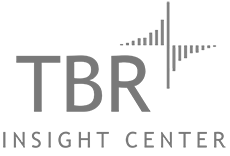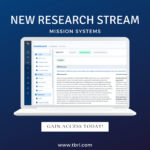KPMG Decarbonization: The change agent helping the firm pivot toward its next chapter
Overview
In early March, TBR had a chance to connect with Mike Hayes, KPMG IMPACT’s Global Climate Change and Decarbonization leader, and Anne-Cecile Moreno, KPMG IMPACT’s Global Climate Change and Decarbonization director, and hear firsthand about KPMG’s strategy and portfolio offerings focused on environmental, social and governance (ESG) and decarbonization. With both topics top of mind for many and at the same time rapidly evolving, it was evident that for both Hayes and Moreno, these are not just business objectives but also personal issues that KPMG is supporting through portfolio expansion and massive global investments as the organization tries to pave the way for broader opportunities beyond services and create an organization that sees climate change as equally important as innovation. This report provides examples of some of these investments and reflects on TBR’s takeaways following the discussion.
Passion plus global investments creates a perfect recipe for success
In late 2021 KPMG announced a three-year, $1.5 billion program focused on supporting the organization’s ESG agenda. The program’s investments will span five areas, including the launch of both the Global Decarbonization Hub and Global ESG Advisory Hub, in addition to regional ESG hubs being established in the Americas, EMEA and APAC focused on developing approaches; the development of talent around ESG skills, such as through KPMG’s relationship with Cambridge Judge Business School and NYU Stern Executive Education; the launch of KPMG Emerging Markets Accelerators supporting the sustainability goals of developing nations; the expanded collaboration with key technology alliances, including Google Cloud (Nasdaq: GOOG), Microsoft (Nasdaq: MSFT) and ServiceNow (NYSE: NOW); and the creation of the thought leadership program Voices of the Sustainable Future.
With Hayes in charge of KPMG IMPACT’s Global Decarbonization Hub, KPMG is spearheading these efforts at scale, developing a framework that will allow staff from across KPMG to participate and support an agenda that could serve as the glue needed to bring 145 member firms together and enable more productive collaboration — something Big Four firms often struggle with. We understand that such relationships can be often aspirational and highly questioned, especially as sustainability go-to-market frameworks have been tested in the past with minimal tangible results.
We believe success with such an effort boils down to leadership. The passion Hayes portrayed during our conversation was nothing short of infectious. Provided Hayes manages to propagate this level of evangelism across the member firms, KPMG will surely have a leg up on its peers when it comes to ESG, with KPMG IMPACT serving as the framework upon which KPMG organizes its knowledge and capabilities around strategic priorities. While KPMG IMPACT carries the components needed to address key issues, including ESG and sustainability, economic and social development, climate change and decarbonization, sustainable finance, and measurement, assurance and reporting, Hayes and Moreno acknowledge that the agenda is a moving target and constantly evolving.
At the same time, the KPMG Global Decarbonization Hub, which is part of the Climate Change and Decarbonization pillar, also supports the organization’s ESG agenda by bringing skills, partnerships, tools, and data and analytics solutions that further enhance KPMG’s advisory-led value proposition while relying on the firm’s “hit squad,” as Hayes described their internal team, to enable change across KPMG, clients and partners in areas spanning climate risk, decarbonization pathways to net zero, policy and legislation, low-carbon investment, and measurement and reporting. While all these fields of play matter and carry an important message and service opportunities for KPMG, measurement and reporting necessitates the use of other parts of KPMG, including the organization’s blockchain practice and portfolio offerings.
Additionally, KPMG Climate IQ, a risk management tool, enables KPMG firms to quantify clients’ exposure to climate change. While KPMG uses the solution largely as a service enabler, they have an opportunity to broaden their clients’ reach should they decide to offer KPMG Climate IQ “as a Service” and enable clients to perform self-assessments. Such a move would also call into question KPMG’s broader intention to develop and sell software assets, something rival PwC has been doing for a couple of years now.
Further, KPMG, along with several other companies, has invested in Context Labs, which will diversify the firms’ technology tool set and expand opportunities beyond advisory and into implementation and managed services when relying on Context Labs’ blockchain-enabled platform for ESG reporting. TBR sees a more holistic opportunity for KPMG in the reporting domain, stemming from the firm’s ability to increase cross-functional collaboration and get tax and advisory staff working even closer together. Proper incentive models must also be established. Scaling such an effort will also depend on company culture and leadership. Hayes could certainly begin such a change.
Alliance partnerships play a vital role in KPMG’s value proposition, as the organization relies not only on technology alliances for technology solutions development but also on industry and academic experts to deepen its knowledge and trust within the ecosystem. For example, KPMG is a gold community member of the Global Reporting Initiative (GRI) and has been supporting the organization’s development of sustainability reporting guidelines. KPMG is also a special advisor to the Task Force on Climate-Related Financial Disclosures (TCFD), providing guidelines that Hayes described as the “bible on climate-based insights.” Supporting industry bodies as they write guidelines strengthens market participants’ trust in KPMG. However, not managing these relationships properly, especially between assurance and advisory parts of the organization, could raise questions around moral hazard.
As TBR has often noted, advisory firms demonstrate value through use cases. This is also the case when it comes to sustainability and decarbonization. During the conversation with Hayes and Moreno, we heard multiple client stories that demonstrated KPMG’s involvement through a rather proactive approach, including often challenging clients around their climate change initiatives, resonated positively with clients. KPMG, like many of its peers, has become customer zero for its own ESG frameworks, which not only is a smart PR strategy but also supports the company’s services value proposition. Some of KPMG’s internal goals include achieving net-zero carbon emissions by 2030, providing high-quality information on climate change, and understanding and improving KPMG’s impact on nature and biodiversity. While one can argue that some of these efforts, portfolio offerings, advisory frameworks and tools are not unique to KPMG, Hayes and Moreno brought up a noble initiative that we feel makes KPMG stand out from the crowd.
Thought leadership through mobilization of global capital
TBR’s analysis of IT services and management consultancies around the decarbonization opportunity has thus far focused on what we view as two tracks — how a company is decarbonizing itself (i.e., customer zero), and how a company is decarbonizing its clients — as these have become the common initial paths embarked upon by firms. In our discussion, KPMG demonstrated its role in a third track around becoming an active player on the wider climate agenda through its new investment concept, Net-Zero Equity. Devised in a hotel room and acknowledged by Hayes as being somewhat “crazy,” the concept was introduced by KPMG at the World Economic Forum, where it was well received, and subsequently developed into a briefing paper in October 2021.
In short, Net-Zero Equity builds off the idea of war bonds and crowdsourcing: seeking small investments on a large-scale basis from ordinary citizens to be funneled into high-risk, yet direct and impactful, decarbonization projects. The concept aligns with two key trends: 1) ESG is moving fast while government and policy making are moving slow, and 2) scaled individual or household capital is ready to be deployed. Proceeds from the investment vehicle would focus not only on areas where capital is not readily available, particularly in developing economies through projects such as building renewable energy infrastructure, but also on the innovation side by helping to fund carbon removal technology, biofuels, storage solutions and other projects. While TBR sees the potential in Net-Zero Equity, we believe KPMG’s clear understanding of its role in bringing an idea to life helps the company walk the talk. KPMG acknowledged that no one vendor can do it all and calls to a wide ecosystem of partners to support implementation areas, such as building transparency and efficiency into the model through blockchain and machine learning. Moving beyond the go-to-market opportunities, Net-Zero Equity proves that KPMG is acting as a thought leader, solution architect and community shepherd around decarbonization on a global scale.
Conclusion
In TBR’s Fall 2021 Management Consulting Benchmark Vendor Profile: KPMG, we wrote: “Accelerating the internal transformation that KPMG started right before the pandemic will help them close the management consulting revenue gap with its Big Four peers. Additionally, successful execution will help KPMG build the foundation of the next chapter of its strategy, which will be centered on developing a hybrid approach. While its peers are heavily investing in managed services capabilities, KPMG’s strategy is to invest in technology capabilities deep enough to establish and/or maintain trust with IT buyers, without going too far down the stack into the implementation space. While many rivals are experimenting with ways to move beyond their core competencies, KPMG is investing deeply around its core offerings to maintain its management consulting value proposition. Establishing proper messaging and setting expectations across the stakeholder ecosystem will also be critical for KPMG’s success as building trust internally with employees and with alliance partners is equally as important as building trust with clients.”
TBR sees KPMG’s investments in sustainability and decarbonization as the catalyst for the change the organization has been pursuing over the past couple of years. While we recognize this is easier said than done, the conversation with Hayes and Moreno, backed by client use cases and broader firm investment initiatives and portfolio offerings, has given us enough proof that KPMG is not simply greenwashing services but rather has placed strategic bets in an area that they truly believe in. TBR will closely monitor KPMG’s progress in the ESG domain as moving forward, just as digital has become ubiquitous after several years of the hype around it ebbed and flowed, sustainability will likely face a similar destiny — simply becoming part of how enterprises operate and report their financials. Hype aside, scaling up will take time, and KPMG must carefully examine the pace and scale of investments in sustainability portfolio offerings to avoid cannibalization of digital transformation opportunities once the market matures. Until then, explicitly defined decarbonization and other sustainability metrics in both KPIs and compensation terms will drive KPMG’s success: the closer to net zero, the higher the total contract value.



